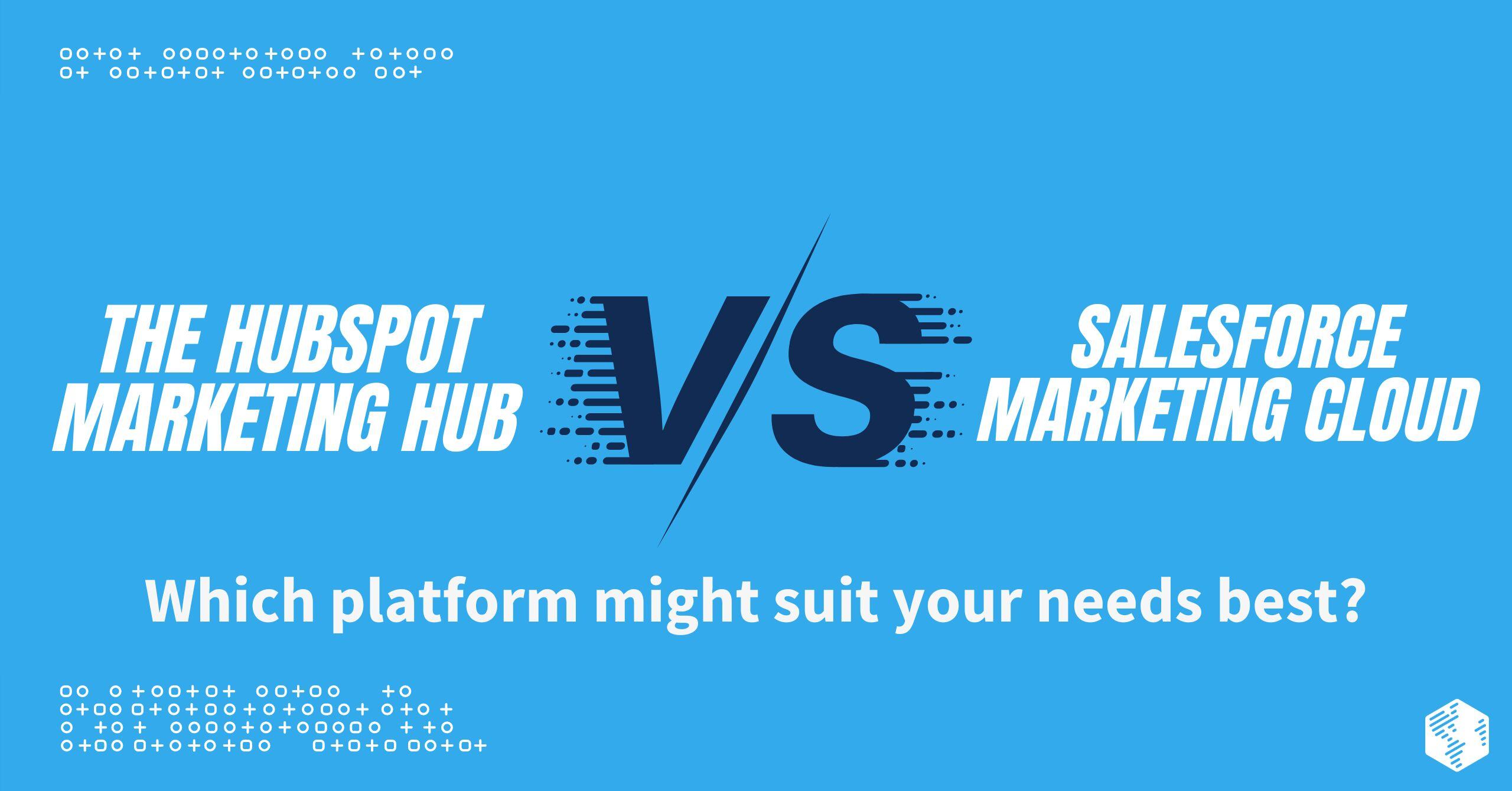Table Of Contents
The latest automation statistics show that 79% of companies use automation for marketing, while 49% leverage it for sales.
Are you harnessing the power of automation platforms?
They can help you streamline marketing and sales efforts, capture more leads, enhance customer experiences and engagement, and save time on repetitive tasks.
HubSpot and Salesforce might be your best options.
Both offer excellent cloud-based software solutions for marketing, sales, and customer service automation. HubSpot Marketing Hub and Salesforce Marketing Cloud are some of their most sought-after products.
They may seem identical at first glance, but their features, interface, customization capabilities, and pricing differ.
This comprehensive HubSpot Marketing Hub vs. Salesforce Marketing Cloud comparison will help you determine which platform might suit your needs best.
Introduction to Salesforce Marketing Cloud
Salesforce Marketing Cloud is a digital marketing platform by Salesforce, a cloud-based software company with a market cap of $157.72 billion and a 32.13% market share. Over 83,200 websites use its software.
Marketing Cloud’s market share in the marketing automation category is 0.89%. It may not seem much, but over 11,800 companies use it.
It’s a part of Salesforce CRM, which includes Marketing Cloud, Sales Cloud, Service Cloud, Commerce Cloud, Experience Cloud, and Analytics Cloud.
Marketing Cloud has automation features and tools for email marketing, advertising, social media marketing, and mobile marketing.
It focuses on data-first digital marketing, helping businesses leverage real-time data to personalize customer journeys across various channels.
Main Components of Salesforce Marketing Cloud
This platform offers many marketing tools in one centralized place. They’re all part of two unique modules: Builders and Studios.
Here are the essential features of these solutions that let you manage marketing campaigns across channels.
Builders
Marketing Cloud Builders help automate marketing campaigns and manage content and data.
You can use them to build and segment a contact list and create and manage content, including emails, images, forms, and landing pages. You can also generate analytics reports to gain insight into your campaign’s effectiveness and fine-tune your strategies for the best customer experiences.
Studios

Marketing Cloud Studios let you manage content across marketing channels, including social media, email, and advertising.
Their cross-channel marketing features are ideal for saving time and making every effort count. You can use them to personalize your website’s user experience, improve ad targeting, create automated workflows, and more.
You can even manage SMS marketing. The platform’s Mobile Studio lets you personalize SMS, MMS, and group messages and send a push notification whenever a customer is near a targeted area.
Notable Capabilities of Marketing Cloud
There are many baseline Salesforce Marketing Cloud features, but these are the most notable.
Social Studio
Social Studio has marketing tools for creating, scheduling, publishing, and monitoring social media posts. It also supports social listening to help you discover brand mentions and trending topics among your followers.
You can tailor posts to specific channels, measure and analyze current and past performance, and seamlessly engage with your audience. Workflow controls make interactions and lead generation a breeze.
Data Studio
Data Studio is Salesforce’s data-sharing ecosystem, perfect for finding new leads and monetizing your customer data.
Besides audience discovery and data acquisition, you can share relevant information with data providers while ensuring control and transparency.
Email Studio
Email Studio lets you build and automate email marketing campaigns. You can create segments with drag-and-drop tools, identify engaged subscribers, and personalize messages for every buyer’s journey stage.
This feature suits all email marketing strategies, from widespread campaigns to one-to-one messages.
Journey Builder
Source: Salesforce Ben
Journey Builder helps deliver personalized experiences across channels throughout the customer journey.
It lets you visualize a B2B buyer’s journey and set automated triggers for proactive customer engagement. You can personalize messaging, modify customers’ paths according to changing behavior, and generate reports to leverage current trends.
User Reviews of Salesforce Marketing Cloud
We’ve combed through user reviews on G2 and Gartner to see what people like and dislike about Salesforce Marketing Cloud. Here are some to give you an idea.

Although most reviews echo these praising words, many users agree the platform isn’t user-friendly and has a steep learning curve.
“The biggest downside is how complex the software really is. I find the most difficult part is not being able to search for something similar to what I want to do. Specifically, I have read a few courses on journeys, but nothing has been found for more complex and longer journeys.”
“There are too many functions, and although it is convenient, I think it takes too long to master. How about improving the interface to make it easier to use, reducing the functions, and creating another simple dashboard?”
That doesn’t mean you won’t like it. It may not be intuitive, but its feature-rich Studios and Builders are excellent for automating your marketing campaigns and getting more leads.
Introduction to HubSpot Marketing Hub
HubSpot Marketing Hub is a digital marketing solution for automating marketing campaigns and leveraging customer data to personalize experiences. It comes from HubSpot, a software company offering inbound marketing, sales, and customer service products.
HubSpot’s market cap is significantly lower than Salesforce’s – only $14.86 billion. However, the company’s 40.85% market share is higher, with over 220,300 websites using its software.
Marketing Hub’s market share in the marketing automation category is 8.52%, meaning over 113,500 companies use it.
This marketing automation platform includes HubSpot CRM and marketing tools for automating email campaigns, social media marketing, and lead nurturing. It also lets you track B2B marketing KPIs and other metrics to improve current and future efforts and convert more leads.
Best Features of the Marketing Hub
HubSpot Marketing Hub is among the top B2B marketing automation platforms because it’s a well-rounded, easy-to-use solution. Its automation features make attracting, nurturing, and converting leads nearly effortless.

Besides blogging, SEO, and ad management, it offers the following features:
-
- List segmentation – create and automatically update contact lists to streamline email marketing efforts;
- Email marketing – craft personalized emails from scratch or use customizable templates and leverage A/B tests to boost click-through rates;
- Social media integration – create and automate social media marketing campaigns, engage with your audience, and monitor interactions;
- Automated workflows – nurture leads and automate other cross-channel operations with customizable workflows;
- Lead tracking and management – segment, score, and convert potential customers using your collected, centralized data;
- Account-based marketing – supercharge marketing and sales teams’ efforts with user-friendly ABM tools for building meaningful customer relationships;
- Form and landing page builders – use customizable templates and an intuitive drag-and-drop builder to make mobile-friendly designs that convert website visitors;
- Marketing analytics – enjoy built-in reporting and turn customer data into revenue opportunities.
READ: HubSpot vs. Salesforce: Which CRM Should You Choose?
User Reviews About HubSpot Marketing Hub
We turned to G2 and Gartner again to see what users say about the Marketing Hub.
“Marketing Hub is extremely easy to use, allowing me to efficiently accomplish any task. I primarily leverage the tool for my company’s B2B marketing and communication needs to agents and partners, including email, landing pages, forms, and CTAs. It’s easy for me to build different aspects of the campaign myself, integrate the assets into our email marketing strategy, and effectively report on formal campaign results – all in HubSpot!
“With HubSpot, having the ability to plan, implement, and track all facets of digital marketing within one easy-to-use platform has been an absolute game-changer for promoting our brand. Every aspect of marketing that I need, from email campaigns to social media outreach, custom design tools, and lead nurturing tips, is accessible within HubSpot, and I have the ability to seamlessly organize and track multiple campaigns on multiple different platforms simultaneously.”
Despite these and many other HubSpot Marketing Hub pros, some users have difficulty creating workflows and customizing templates. Others wish they could create multi-step forms for a fluid experience.
“The workflows for automation are a bit cumbersome but still a much easier platform than the competition offers.”
“In order to change built-in templates, one needs technical or coding experience. Sometimes, the style or layout does not work with the drag-and-drop appropriate format. You must carefully consider the layout for mobile browsing if you are utilizing more than one row.”
Despite these minor drawbacks, you’ll enjoy using this user-friendly platform to streamline all marketing activities.
Price Comparison
Many users mention price tags when reviewing these platforms. For instance, they say Marketing Cloud pricing is too high, while its HubSpot counterpart isn’t flexible when scaling up.
However, the latter charges you only for marketing contacts in HubSpot CRM, while you can store non-marketing connections for free.
Salesforce has a per-user pricing structure and doesn’t include all tools in one payment plan but offers them as standalone solutions. That could drive your subscription through the roof, depending on how many features you need.
HubSpot also has a free version, making it an obvious choice for many. However, using it for free means enjoying limited automation features and other capabilities. A demo is available for premium plans.
Salesforce doesn’t offer a free version or a free trial.
Here’s Salesforce Marketing Cloud pricing (annual billing):
- Email, Mobile, and Web Marketing
- Basic – starting at $400/month for email marketing, content creation, and Sales Cloud integration
- Pro – starting at $1,250/month for marketing automation with email solutions
- Corporate – starting at $3,750/month for cross-channel marketing tools, including Mobile Studio and Journey Builder
- Enterprise – custom pricing for multi-channel journeys across brands and locations
- Marketing Cloud Account Engagement (maximum 10,000 contacts)
- Growth – $1,250/month for email marketing automation, personalization, and lead generation
- Plus – $2,500/month for advanced automation and analytics
- Advanced – $4,000/month for sophisticated marketing automation, reporting, and AI
- Premium – $15,000/month for enterprise-ready tools with predictive analytics, personalized support, and 75,000 contacts maximum
- Marketing Cloud Advertising
- Basic – starting at $2,000/month for activating CRM data, real-time lead capture, Journey Builder, security and access controls, and always-on campaigns
HubSpot Marketing Hub pricing (annual premium plans) is the following:
- Starter – starting at $45 per month for 1,000 marketing contacts (you can buy more in increments of 1,000)
- Professional – starting at $800 per month for 2,000 marketing contacts (additional connections available in increments of 5,000)
- Enterprise – starting at $3,600 per month for 10,000 marketing contacts (buying more includes increments of 10,000)
A monthly subscription is available, but it’s slightly pricier. The pricing plans include 80+ features, so visit the website to see what each offers.
Salesforce Marketing Cloud vs. HubSpot: Which Platform Is Better for You?
Both platforms provide marketing automation benefits and have downsides.
Salesforce Marketing Cloud has excellent automation features (best for email marketing) and more advanced reporting than HubSpot.
However, it takes time to master, and many of its marketing and automation features are available as standalone tools. Still, you can use coding capabilities to customize them.
Marketing Hub doesn’t allow custom coding and requires upgrading to a higher pricing tier to access more tools.
However, it’s an all-in-one marketing automation platform with well-rounded features for personalizing customer journeys and growing your business. It even supports Salesforce integration and has a free version ideal for small businesses.
It’s up to you to choose the winner of the Salesforce Marketing Cloud vs. HubSpot showdown, but you can use both to combine the best of their worlds.
Conclusion
We hope this HubSpot Marketing Hub vs. Salesforce debate will help you make an informed decision and pick the best platform for your needs.
Read our previous blog to learn about generating leads in HubSpot before exploring how Salesforce can boost your email marketing efforts.
OneIMS is here if you need help attracting ideal buyers and increasing sales and revenue. Check out our solutions to see how we can help grow your business.






